Today’s newsletter is kindly sponsored by Chemy Lane. Chemistry lit reviews eat your time and budget! But Chemy Lane's AI slashes subscription spend and cuts search time in half. It references 120M chemistry publications, and recommends you the most relevant papers for your research. Transform your chemistry research from guesswork into groundbreaking. Use code NACKE20 to get 20% off their Essentials plan at chemylane.ai
"Out of clutter, find simplicity. From discord, find harmony. In the middle of difficulty lies opportunity." This Einstein quote hits differently when you're staring at an overflowing calendar in 2025's academia. With AI transforming education, rising admin demands, and pressure to publish, time management is vital. It's not just a nice-to-have skill—it's academic survival.
Remember that scene in Inception? They're building dream layers within dream layers, each with its own set of rules and challenges. That's basically what being a faculty member feels like. Except, instead of dream levels, we're navigating parallel universes of research deadlines and student emails. And that creature called work-life balance. Because genius-level expertise in your field doesn't automatically translate to genius-level calendar management.
Let's not kid ourselves: succeeding in academia requires more than being the top dog in your field (though that helps, woof). It's about mastering the meta-skill that determines whether you'll thrive or merely survive in academia: Time management. Without it, even the best research ideas and teaching plans crash like a computer without the latest hotfix.
I want to chat about battle-tested strategies for mastering academic time management today. Because contrary to what your impostor syndrome might whisper in your little ear. You can have both an impactful career and time to watch that new Netflix series that everyone is talking about. Or take an ice bath. Whatever floats your boat, bro.
Avoiding procrastination
Let's talk about academia's dirty little secret. Procrastination. Turns out 80-95% of college students are chronic procrastinators, and spoiler alert: getting a PhD doesn't cure this habit. It's like levelling up in a game only to find the final boss is still your own tendency to say "I'll do it tomorrow." What to do?
Time Blocking
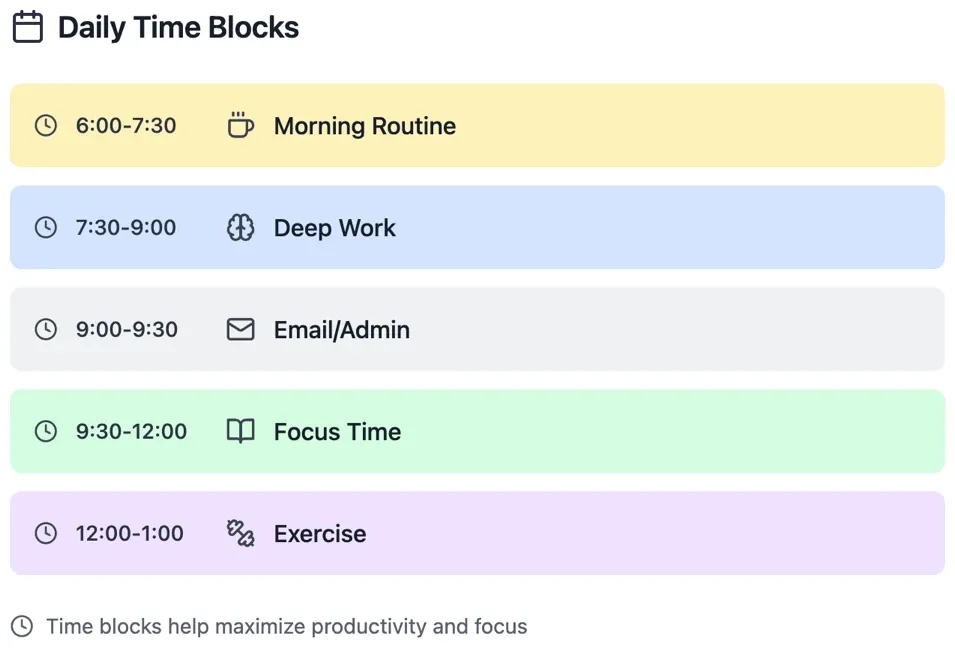
Time blocking is a great solution. It creates a force fields around your most precious resource: Your focused attention. Instead of letting distractions fragment your day, you're building boundaries around your mind. Our brains aren't wired for constant task-switching. So, checking email while writing that grant proposal is hard. It's like trying to pat your head and rub your stomach at the same time. The solution? Dedicate specific time blocks for deep work. Those sacred hours when your research actually moves forward. For me, this means protecting my writing hours (8-11 AM) with the same ferocity Vhagar defended Aegon the Conqueror (Any House of the Dragon fans here?). Teaching prep gets its own block in the evening when my creative energy rises again. The key isn't perfect adherence to your schedule. It's creating a rhythm that respects your peak performance times and natural energy cycles.
Use the 80/20 rule
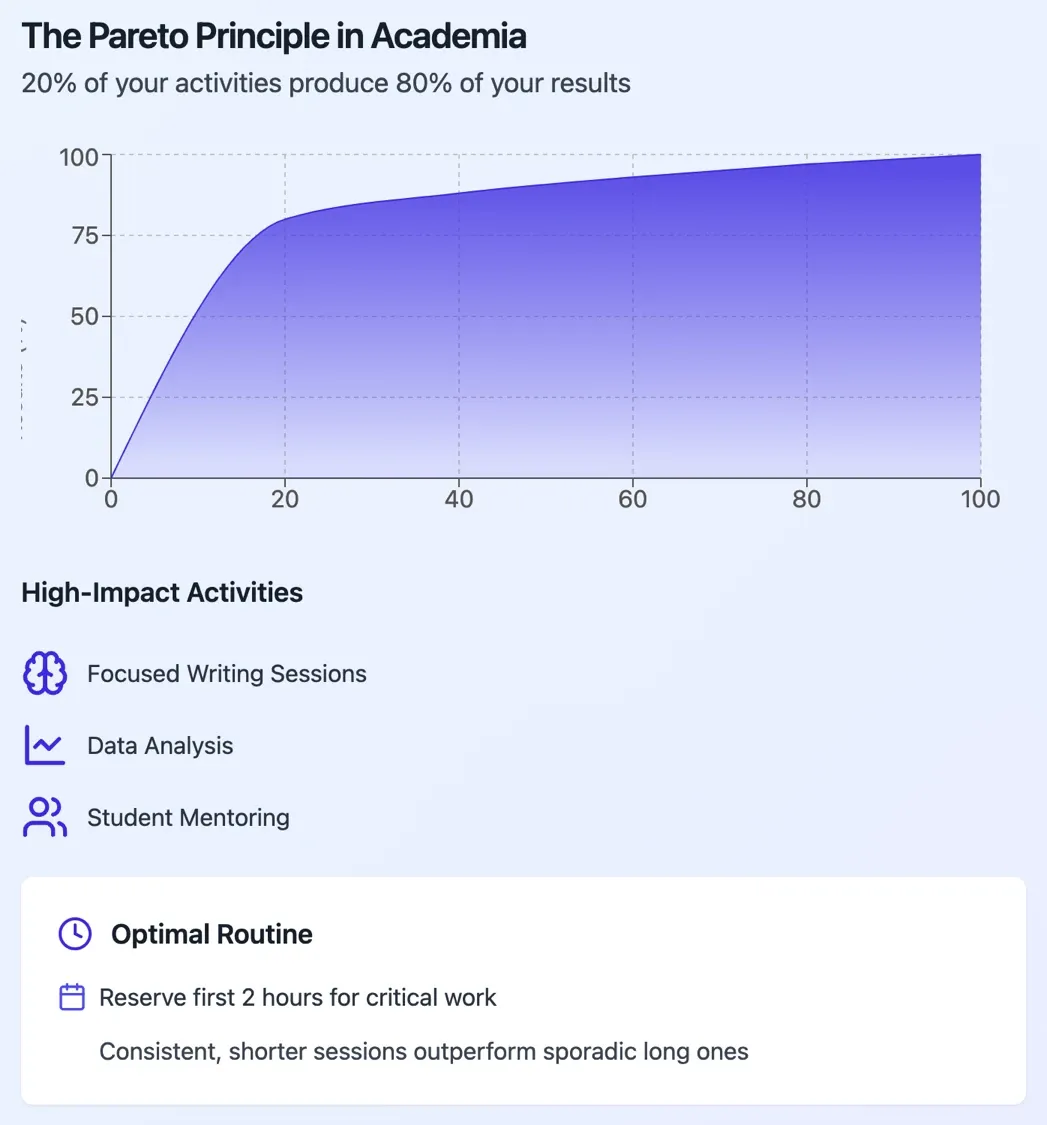
Many academics find that not all tasks are equal—often, 20% of your activities produce 80% of your results (known as the Pareto Principle). Identify which activities (e.g., writing, data analysis, mentoring) help your goals. Then, give them enough time. Establish daily or weekly routines to protect those high-value activities. For example, you might reserve the first two hours each morning for writing or lab work, when your mind is freshest. Studies on faculty productivity show that a consistent, short writing schedule is better than sporadic, long sessions. Consistency builds momentum and makes large tasks feel more manageable.
Break down those mammoth academic projects into bite-sized chunks. A research paper becomes a series of achievable milestones, each with its own deadline. These techniques help you focus on high-priority work. They let you avoid the less important busywork. So, you make progress on what matters for your career.
SMART Goals
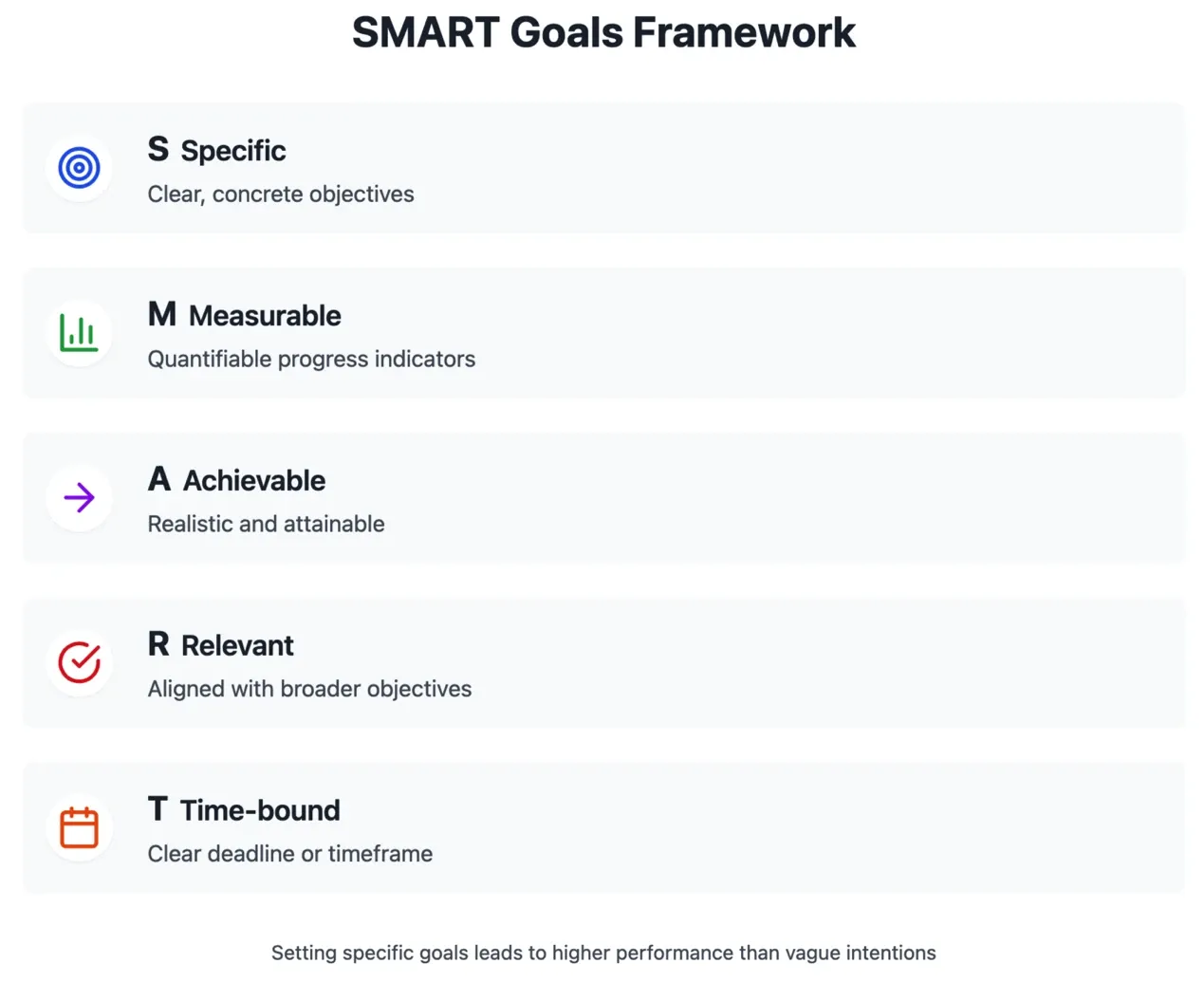
SMART goals are more than a funky acronym to memorize. They're your framework for turning vague aspirations ("I should work on that paper") into concrete achievements ("I'll complete the methods section by Friday"). Specificity makes all the difference here. SMART goals (Specific, Measurable, Achievable, Relevant, Time-bound) provide clarity and motivation. Goal-setting theory shows that specific goals lead to higher performance than vague intentions.
Eisenhower Matrix
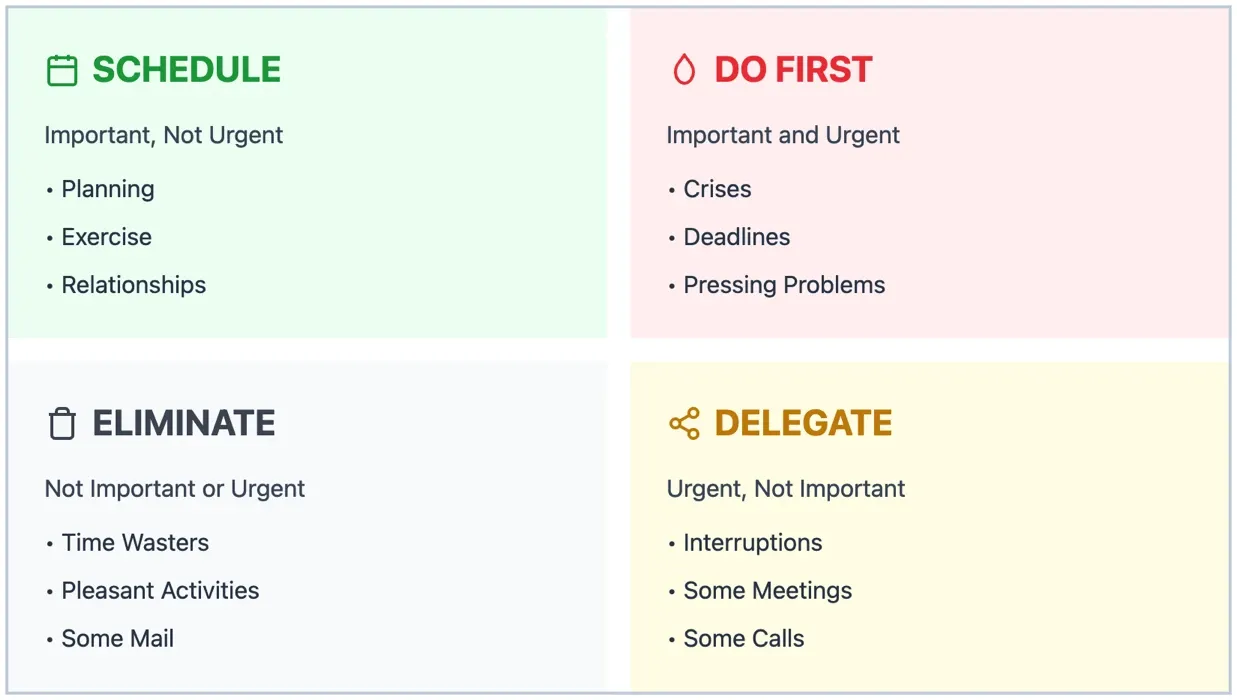
Here's where the Eisenhower Matrix comes in. It's named after that Eisenhower, who somehow managed to be a president and still have time for hobbies. This four-quadrant approach helps you find what's truly important: your research agenda. It also helps you avoid what just feels urgent, like that email thread about office coffee. Categorizing tasks as "important" or "urgent" helps turn chaos into clarity.
The 2-2-1 Rule
A time management hack turned my chaotic calendar into a manageable one. It's Marie Kondo meets academia, but for your calendar. The 2-2-1 rule is beautifully simple.
- Dedicate two days to research alone (think: deep work, no email kryptonite allowed),
- Two days to teaching prep and delivery (yes, even those 8 AM classes),
- One flexible day for shit that likes to hit the fan.

Why does this work? Because academia needs both intense focus periods and strategic recovery times. That flex day isn't just a buffer. It's how you can handle the surprises of university life, like sneaky committee meetings and pesky grant deadlines. Its beauty is in its flexibility. Some weeks, research commands the spotlight. Others, teaching takes centre stage. But, you always have a framework to move forward. Think of it as your academic operating system. Stable enough to be reliable, flexible enough to handle unexpected crashes.
Boss battles and breaks
Boss Battle Method
Deep work sprints with recovery periods
Deep Work Sprint
90:00
90-minute focus session
Deep Work
90 minutes
Recovery
20 minutes
Managing time doesn’t mean working nonstop. Research on productivity highlights the value of short breaks to recharge your focus. I like the boss battle method (i.e., intense 90-minute deep work sprints followed by 20-minute recovery periods). This maintains my peak cognitive performance. In video games, game designers create rest periods between boss battles to keep players engaged. Regular breaks prevent mental fatigue and improve productivity when you return to work. This rhythm takes inspiration from that and matches your brain's natural ultradian cycle of focus and recovery. The key is treating each work sprint like a boss fight. Complete focus. No distractions. A clear goal to hit before your power bar runs out.
The 52-17 method is a shorter alternative
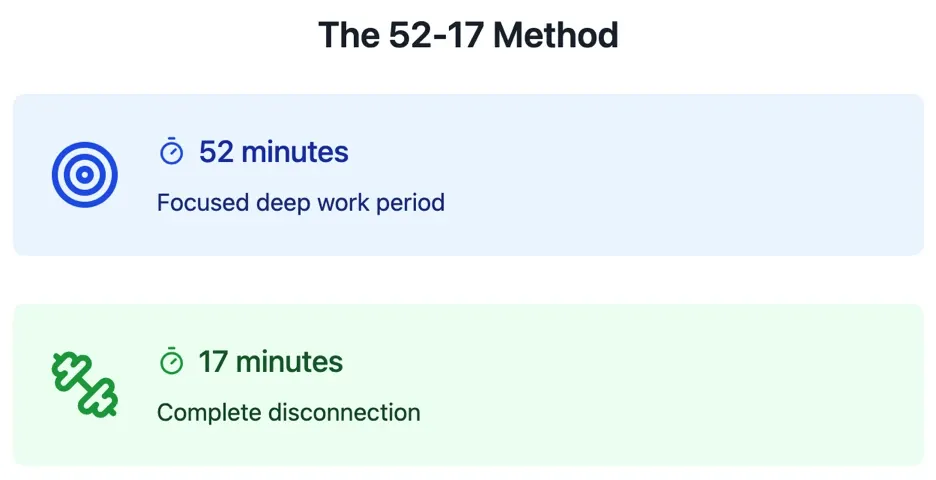
This method relies on productivity research when tracking high performers. It maintains concentration. This approach alternates 52 minutes of focused work with 17 minutes of complete disconnection. This gives your prefrontal cortex time to recover and consolidate learning. It maintains the momentum of your work session. Think of it as academic interval training for your brain. I'm more of a boss battle kind of guy, but my colleagues have had success with this method.
Overextending yourself without rest can lead to diminishing returns and burnout. Instead, working in focused sprints with planned downtime keeps you efficient and energized. In academia, where the to-do list is endless, smart time management is as much about saying no to low-value commitments as it is about scheduling the important ones. Strong time management habits—goal setting, prioritization, and regular routines—prevent procrastination from derailing you and help reduce stress. You'll get more done in the long run and feel less stressed if you pace yourself and set boundaries with your time. Being organized with your time means you can be more present and prepared in the classroom. In turn, this invigorating teaching experience can then spark new research ideas. Establish clear boundaries between work and home life when possible. Practice self-care (exercise, hobbies, or time with family) to recharge. In academia, taking care of your own well-being will help you sustain your passion and avoid burnout in the long run.
P.S.: Curious to explore how we can tackle your research struggles together? I've got three suggestions that could be a great fit: A seven-day email course that teaches you the basics of research methods. Or the recordings of our AI research tools webinar and PhD student fast track webinar.






